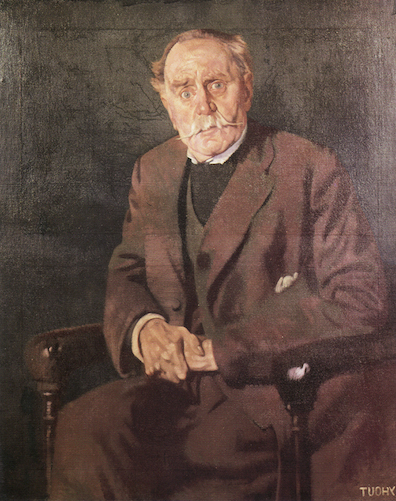Walking along the sand flats, Stephen wonders whether he will
walk inland to visit his mother's brother's family in Irishtown, and the
thought conjures up his "father's voice," acerbically
complaining about the in-laws for nearly a full paragraph of
text.
Joyce's father John Stanislaus Joyce, fictionalized in the
novel as Simon Dedalus ("uncle Si"), carried
a fierce sense of his patriarchal heritage, and he despised
May Murray's father and brothers: "O weeping God, the
things I married into." Simon Dedalus calls his two
brothers-in-law "Highly respectable gondoliers,"
implying that they are denizens
of the lower class. "De boys up in de hayloft"
likewise seems to imply that the Gouldings are country
bumpkins.
John Joyce's prejudice was inflamed by the Murrays' dislike
of him (he already drank too much when he was courting May,
and her father John correctly supposed that he would not make
her a good husband). It was perversely confirmed by his mother
Ellen, who adamantly refused to bless his marriage to May,
"regarding the Murrays as beneath her" (Ellmann 18). In the
novel, Simon's own inveterate alcoholism does not stop him
from referring hypocritically to Richie Goulding as "The
drunken little costdrawer."
Ellmann notes that William Murray, the model for Richie
Goulding, did indeed require "his children to call him 'sir,'
and when he was drunk treated them savagely enough. But he was
a fair singer of operatic arias, and he was married to a woman
whom all the Joyce children, including James, depended upon
for help and advice. Josephine Giltrap Murray ["aunt
Sara" or "aunt Sally" Goulding in
the novel] was intelligent, resourceful, and unfailingly
generous, attributes that could not be too abundant in those
harassed lives. She seemed to her nephew James to be a wise
woman, and he brought her his shocking problems without
shocking her. She had musical training, too, and sometimes she
and John Joyce and May would play trios on the piano" (19-20).
Simon may be unfairly nasty toward his in-laws, but he is
also eloquently witty: "sirring his father, no less!
Sir. Yes, sir. No, sir. Jesus
wept: and no wonder, by Christ!" Here as
elsewhere, the strains of Joyce's "father's voice" weave their
dry irony into the fabric of Ulysses.
